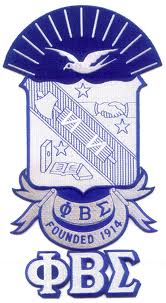
The Alpha Mu chapter of Phi Beta Sigma was established in 1935 making it the first to be chartered at the institution then known as Princess Anne Academy.
The Afro-American newspaper reported in 1947 that fraternity members welcomed to campus a sister organization, Zeta Phi Beta, which it assisted with community service activities. The article also notes Phi Beta Sigma was still the institution’s lone fraternity.
Over the years, members have organized student forums, embraced the “adopt-a-highway” program, lobbied for an intercollegiate soccer team and hosted annual balls and parties.
Represented by the Greek letters for brotherhood, scholarship and service, the Sigmas were founded Jan. 19, 1914 at Howard University. Chapters quickly spread to such other institutions as Morgan College in Baltimore and Wiley College in Marshall, Texas. The organization’s motto, “culture for service and service for humanity,” appealed to those institutions and the students attending them.
Kappa Alpha Psi proposed a merger to expand their influence collectively, but Phi Beta Sigma declined. The fraternity’s colors are royal blue and pure white with a dove as its symbol.
Civil Rights Movement and activism:
In the 1920s, Sigmas, led by James Weldon Johnson, fought for anti-lynching laws. By establishing the Bigger and Better Business program in 1925, the fraternity paved the way for future civic involvement. Members worked during the Great Depression to provide scholarships for brothers or chapters in dire straits. Calling on colleges to provide much needed business courses, Phi Beta Sigma president Arthur W. Mitchell’s aim was to expose African Americans to the same opportunities for patronage and support that whites experienced. In the mid-1940s, the fraternity established a Social Action program, which further cemented its civil rights activities in the decades that followed.
A Sigma who stepped into the spotlight during the turbulent 1960s was John Lewis, chairman of the Student Nonviolent Coordinating Committee. He campaigned against segregation in Georgia and became involved with civil rights by sitting in at lunch counters, and enduring beatings and arrests in his efforts to desegregate public facilities. Lewis and Hosea Williams led the protest march from Selma to Montgomery, Ala. Sigmas including Asa Philip Randolph played in influential role support of the 1963 March on Washington. Randolph also help established the Southern Christian Leadership Conference. Huey P. Newton was a co-founder of the controversial Black Panther Party in 1966.
Recent programs/projects:
Education programs, the Phi Beta Sigma Credit Union and Sigma Beta clubs helped African-American business and youth excel. The fraternity places an emphasis on health and well-being program by supporting Sigma Wellness, Living Well Brother-to-Brother, the National Marrow Donation Program and an AIDS/HIV Epidemic awareness program. Members support the American Cancer Society and the March of Dimes.
Sigmas sponsor National Debate and National Oratorical contests as a way to expose African American men to careers in law and politics.
Project Sigma Economic Empowerment Development is designed to support financial management and home ownership, and Project Vote focuses on voter education, registration and participation. A partnership with the IRS promotes tax understanding and free tax preparation for low-income families is another community services the fraternity offers.
Members of note:
- George Washington Carver – pioneering botanist-educator
- James Weldon Johnson – co-author of “Lift Every Voice and Sing”
- Al Joyner – Olympic athlete
- Emmitt Smith – professional football player
- James T. Williams – executive, Goodyear Tire & Rubber Co.
- Frank M. Davis – author, journalist during Harlem renaissance
- Ellis Marsalis – world renowned jazz pianist and composer
- Armstrong Williams – syndicated newspaper columnist
- Lou Brock – Major League Baseball Hall of Fame
- Rod Paige – former U.S. Secretary of Education
— Frederick Douglass Library archives staff

